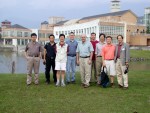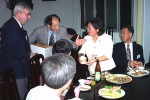Andrew Corbin, Kellogg Biological Station LTER — The author wishes to thank Hen-biau King (Taiwan Ecological Research Network), whose tireless efforts and extraordinary hospitality played a key role in the success of this workshop.
The first International Workshop on Long Term Ecological Research in Agricultural Ecosystems took place 11 November 2002 at the Taiwan Agricultural Research Institute (TARI ) in Wu-feng, Taichung, Taiwan. The five-day event was organized by KBS, TARI, and the Chinese Forestry Association. Workshop sponsors included the Taiwan Council of Agriculture (COA), TARI, NSF and the East Asia - Pacific Regional LTER Network Committee.
The objective of the workshop, which eminated from the LTER All Scientists Meeting in Snowbird, Utah (2000), was to provide insight and advice from KBS researchers and administrators to those in Taiwan, Korea and China who are considering establishing new or enhancing existing agricultural LTER sites. Over seventy researchers and administrators from the U.S., Korea, China, and Taiwan participated in the workshop. Principles and overseas guests spent the rest of the week visiting LTER and other research sites throughout Taiwan.
The Director-General of TARI, Chien-yih Lin, welcomed participants by recognizing “The unprecedented scale of agricultural expansion and intensification has raised concerns about the state of agroecosystems.” Effects of intensification are stressing the integrity of agroecosystems and generating negative impacts on other ecosystems in Taiwan. Lin cited examples such as “soil erosion on downstream fisheries and reservoirs damaging both [these] aquatic ecosystems” and “fertilizer and pesticide residues in water resources, air, and crops [affecting] human health.” With his introductory remarks, Chiu-chung Young, from the department of Soil and Environmental Sciences at National Chung Hsing University also acknowledged the concerns brought about by high input agriculture within the ecosystem and advocated the importance of long term ecological research for developing sustainability within modern agriculture. In his greeting, Shan-ney Huang, Director-General of Taiwan’s Food and Agriculture Department stated: “This workshop focuses on agricultural ecosystem management at the ecosystem level, which I believe is an advance in agricultural research... [and] serves as a platform to discuss possibilities of establishing new and enhancing existing agricultural LTER sites in countries of our region. I’m looking forward to seeing collaborations among representatives from each site which occur within and following this workshop.”
In the keynote address, “LTER in Agronomic Systems: Importance, Infrastructure and Administration” Mike Klug (KBS) considered the typical grant funding process, “...they are really funded in very short time periods and as a result we have lost a lot of information about those broad temporal and spatial scale differences that we see within these systems...”
The talks were separated into three categories:
- Session I, General Reviews of Ecological Research in Agriculture consisted of Ecological Research in Agricultural Ecosystems in Korea in which Ohseok Kwon, and Eun-Shik Kim from the National Institute of Agricultural Science and Technology (NIAST) focused on the importance of the role of governmental bodies to support ecological research in agroecosystems and the collaboration among participating nations to maximize research productivity. Susan Chang, Chief, International Organization Division COA, gave an overview of Agricultural Research in Taiwan where she pointed out that safeguarding the ecology and the environment is one of the top three policy objectives of the COA. Jiabao Zhang from the institute of Soil Science in Nan-jiang, Chinese Academy of Science spoke on long term monitoring and study of nutrition in agricultural ecosystems in China.
- Session II, Ecosystem Approaches in Agricultural Research included a Study on Soil Ecology and productivity Improvement of Maize-Rice Cropping in Taiwan by Chiu-chung Young. Nutrient Budgets and Transformations in Subtropical Arable Land was addressed by Hong-chi Lin from the department of Agricultural Chemistry at NTU, and Zhu Ouyang from the Institute of Geography and Resources, Chinese Academy of Sciences presented a study on Long Term Monitoring of Water and Crop Productivity in Agricultural Ecosystems.
- Session III Sustainable Management involved four talks. Project Management, Sampling and Analysis by Andrew Corbin. Chen-fang Lin of the Department of Soil and Environmental Sciences, NCHU spoke on Data Management of Soil Information. Tim Bergsma - KBS LTER deliberated on Designing and Maintaining an Information Management System and Yuong-how Tsai, Chief, Chi-Nan Branch of the Kaohsiung District Agricultural Improvement Station introduced a Long-Term Field Trial for Organic and Conventional Farming Systems.
Consequent discussion contemplated ecosystem landscape approaches such as sustainable management, ecological processes and services and minimizing environmental impacts on a crop by crop basis. The main outcome focused on the need to establish a interdisciplinary team of international collaborators to find common links between cropping systems.
Collaborators can benefit from first-hand counsel of researchers and administration through phase two of the workshop which will include a visit from the East Asia group to KBS in early summer of 2003.

 Enlarge this image
Enlarge this image
